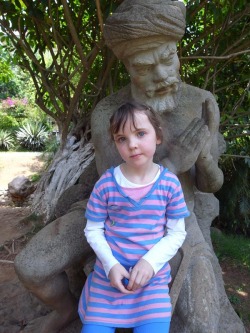 Edie with Ba Yanlong. Ba Yan Long is one of the many statues in Simao's Tea Culture Garden, where we hung out for a few hours this morning. A rock nearby has the following, very difficult-to-read, engraving:
"Ba Yanlong was a tribal chief of Bulang nationality. More than one thousand years ago he led the Bulang people to plant tea on a large scale in the Mengmai and Mengjing area of Lancang. He gave tea a special name and up until the present day these ancient 10,000 mu of tea are still full of life."
The Tea Culture Garden is one of the many points of interest Ali writes about in his Yunnan book.
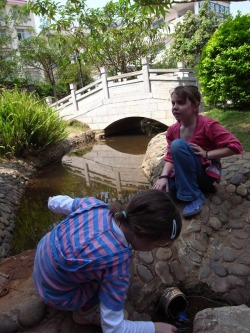 Freda and Edie set water snails off down the stream in boats made from bottle tops.
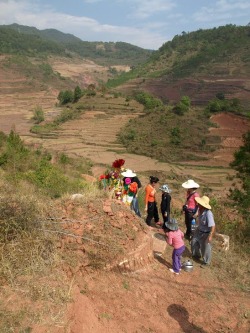 Our first stop - Zhang Yun's mum's grave For our fifth Qingming Jie (tomb-sweeping festival) in China we were honoured to be invited to Mohei by our good friend Zhang Yun, to visit her family, both living and deceased. Qingming is a time for remembering ancestors, visiting and cleaning the graves of departed relatives, placing flowers on tombs and burning ghost money. Getting to Mohei was the hardest part, as the rest of Simao was also on the move for this 3-day holiday. Mohei, an old village of wood-fronted houses, lies in a fertile valley half an hour north of Ning'er and is renowned for its salt mining, sausages and location on the Ancient Tea Horse Trail. It's about to find itself positioned once more on a major trade route as the new Kunming-Xishuangbanna expressway blasts through the outskirts of town.
After a quick lunch - including the best nimeng huang gua (lemon cucumber) I've ever had - we set off for the hills, stopping off briefly to buy all the necessary decorations and offerings. These included tinsel flowers, fake money and gold paper ingots. We also carried a large kettle of boiled spring water, food offerings and peach leaves, to ward off the ghosts (not the mosquitos, as Sue had us believe for a while!).
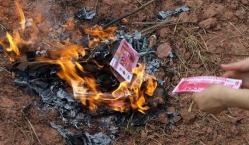 Zhang Yun burns 'ghost money' While Zhang Yun burned the money and the incense smouldered around the tomb, the men (Zhang Yun's uncles and boyfriend) smoked cigarettes, which they stubbed out on the ground and placed on the tomb's mantel. These weren't the only forms of litter we saw left at the tombs on the hillsides. Other graves were littered with plastic bags, paper cups, water melon peel, chopsticks and scraps of food. The first time we saw this, a few years back, we felt somewhat surprised that a tomb-cleaning ritual should end with the discarding of so much rubbish. This year I found myself reappraising the significance of this apparent disregard for aesthetics and the environment. Now I wonder if this litter is left as a mark of rememberance - clear evidence that relatives have paid a visit and the deceased was loved. As we left Zhang Yun's mum, her uncle called towards the tomb: "So, we all came to visit and we'll come again next year. We'll come again next year." The same ritual was carried out at each grave we visited.
Ali hanging out with "First Uncle", "Fifth Aunt" and "Seventh Aunt", at the old family home in Mohei. At 5pm all five living siblings and their mother (Zhang Yun's grandfather's "number two wife", now 86 years old) gathered with their families for a banquet. There were over 30 people there, including us, and all the dishes were prepared on a single solid-fuel-fired wok in a tiny kitchen. Our efforts to help were firmly refused but we did manage to contribute some watermelon and local sausage. 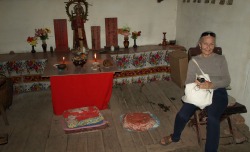 Sue taking a break at Mohei's temple, which we visited later in the day. 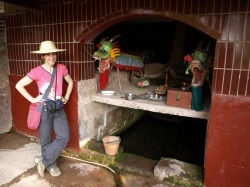 Resisting the temptation of the healing waters at Shui Jing Gong (Crystal Spring Temple). Ali, on the other hand, glugged down a ladleful and we're awaiting the side effects - good or bad.
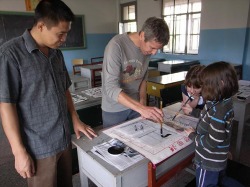 Li Xinqiang instructing Ali There are many things it would seem a pity not to take advantage of studying in China - calligraphy is one of them. We have a few resident experts in the College and have had an open invitation to join in their Saturday morning calligraphy sessions for over two years. This morning we finally made it. As the only calligraphers we had Mr Li all to ourselves. Just as well really because we needed a lot of guidance to get started. I remember trying it once in Xi'an, when we first arrived in China in 2005, and it seemed impossibly hard. Over four years on, with a little more knowledge of Chinese characters, strokes and writing, it was a little bit easier. Having said that, in the two hours we were there I only produced about two or three strokes that passed the inspection. Freda and Edie had already moved onto their names before I'd even passed the dian (dot) stage. It's one of the many things in life that looks MUCH easier, when done by an expert, than it is. Nevertheless, we aren't going to give up and have already invested in our own brushes, ink and mats. I'm determined to shock Mr Li with my rapid progress when we see him next week.
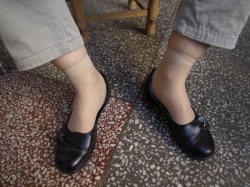 As the Chinese National Anthem got into full swing on Monday morning and the students raised the flag, Lesley was pulling on her satin, flesh-coloured pop socks - a sign that she really has been here too long? What is it about this 'look' that's just not quite what we're used to? We've pinned it down to discretion. Aren't pop socks meant to be the cheat's version of tights or stockings? They're a discreet way to cover one's skin but still have a semi-natural look. I'm sure that the band just isn't designed to be showing. Who knows? Podering these cultural idiosyncarcies and our own reactions to things is fun.
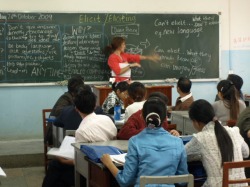 Ali visited my training workshop today to snap a few pictures but found it hard to catch me motionless. This picture was the best, with only one arm flapping up and down at high speed. I'll have to slow down....
The trainees are into their second day of full-on activities and are already coping better with the methods and requirements of the course. I'm trying my best to keep the structure of each session simple and logical, with key points written on the BB and translated into Chinese by the participants themselves. Nevertheless, some teachers are concerned that English is a barrier (even if they are all English teaachers) and gets in the way of them understanding. After doing this work for over four years however, I don't believe this is as big aThe main challenge for most teachers is their study habits. Even when instructions are given in Chinese (all tasks have been translated into Chinese in the workbook) and they have a clear model, many teachers find it difficult to fully complete the tasks - mainly because almost all the tasks involve thinking and reflecting. These are new study skills for many of the particicpants. It's convenient to say, "I can't do it because my English is so poor" but it's an easy way out that reflects the learning culture. The fact is, I speak very little English in class and when I do it's usuallly instructions or simple questions, which I offer in Chinese if participants show signs of confusion! My response to the "my English is very poor" statement is: "If you don't understand, say so"; "If you don't understand, think about it more or discuss it with your partner"; "If you don't understand, ask the trainer to repeat the point or give a model." The difficulty the trainees have with asking a trainer to repeat something, or saying, "I don't understand" may well be culturally rooted. To put it simply, it's a cultural taboo to publically point out a teacher's weaknesses - and that is how a question might be interpreted. It might be like saying: "I don't understand because you are a bad teacher". Secondly, it may be taken as a sign of the trainee's own weakness or failing, like saying: "Look at me, I'm so stupid I can't understand what she means". So, if trainees don't understand, they tend to just sit and wait for someone else to tell them the answer, or for the trainer to write it on the blackboard. Another problem is habit. After 10+ years in education and similar leader-centred work environments, many teachers don't know how to cooperate, how to discuss and work together. Very often, when asked to have a group discussion, they sit and scribble away in their workbooks on their own. Making sure everyone understands is certainly a challenge, but only a small part of that is about the verbal language although this is always the excuse they fall back on. It's about culture, about habits, about attitudes, about behaviour. What really matters is what we do with the language, the context in which we use it, the part we play in trying to understand and trying to be understood. I'm trying my best to make this process as easy and effective as possible. This afternoon I'll have a chat to the participants about what THEY need to do to be more active learners.
The Primary school mums are a trendy bunch, though they could do with checking the English on their T-shirts. This week a Grade 1 mum had "I'm his bitch" across her chest and this woman [above] claims she, "Will f*** for coke." My question is, what do we have to do for freedom of internet access? The answer is: Wait and hope for the best. Perhaps this mum has the same attitude?
Before discovering this morning that we could access our Weebly blog after weeks of being blocked, I started a new space, in Windows Live. I think I'll keep it on the back burner. I'm sure this won't be our last brush with excessive censorship!
Long live freedom of speech! (That comment alone will probably get this blocked.)
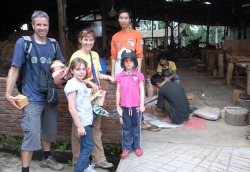 On a recent cycle up tea mountain I met this chap, Mr Tang, who was selling handcrafted wooden items from a makeshift craft stall. We got chatting and promised to make a trip out to their wood yard one day. True to our promise we travelled to San Jia Cun, a small village on the outskirts of Simao that's slowly being gobbled up by tower blocks. After a tour of the woodwork studio, kilns and art studio we rummaged through the reject piles, returning with a few boxes and tea caddies. After hanging about the house these rainy days it was great to get out of town and have a small wander. Needless to say, San Jia Cun has changed a lot since we were last there. Half the older red brick houses have been replaced by white-tiled, concrete monstrosities double the size. I understand people want larger, newer houses, but why not build larger brick ones, and just stay off the ceramics? There's no accounting for taste I suppose.
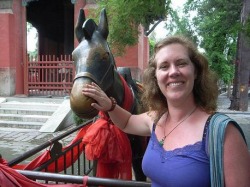 Noreen and the Wonder Donkey in Beijing's Dongyue Temple After a jet-lagged night I slept in for my 10 am rendezvous with Noreen, fellow VSO volunteer now working in Gansu, on our first morning back in China. Dongyue Temple was the perfect place to sit and chat, in the shade of the cyprus trees. It was also reassuring to discover, thanks to the ticket inspector's handy gadget, that I haven't developed a fever, these days taken to be indicative of swine flu. I was allowed to enter.
After a couple of hours of catching up and hatching a travel plan, Noreen stroked the Wonder Donkey for good health and fortune, and we left.  Lesley and Edie standing in line for tickets at Beijing Central railway station We've decided to head over to visit the eastern end of the Great Wall, at Shanhaiguan (literally translated as 'mountain sea pass'), where it apparently snakes into the sea. I'm not sure if buckets and spades will be in order but we're looking forward to exploring a new area. It's three years since our visit to the Great Wall at Jiayuguan, in the sparsely populated desert of North-west Gansu. As Beijingers head to the seaside for the weekend I think we're in for an altogether different experience.
With Noreen and Edie there for moral support, ticket-buying was a doddle. We opted for the male vendor in the end, after an off-putting first and second interaction with a woman who refused to make eye contact as she barked the train information out over her personal, loud, tannoy. In our experience of bus and railway stations, the men are more patient and friendly. Today was no exception. We leave Beijing on the 14:08 express train the day after tomorrow. Any earlier and it would be standing room only - not a pretty sight.
Ali and Freda paid a visit to a local deli this afternoon, purchasing ingredients to cook an Italian meal at Howard and Lin's flat. Although we all climbed into bed at a fairly normal hour, it was a strange night - Freda talking in her sleep ("No mummy, it's too embarassing to do it here.") and some kind of explosion that shook the building at 2:30 in the morning. That's slightly alarming when one's on the 25th floor.
Time to brave the heat and head out for some breakfast ingredients. With the heavy smog and lack of direct sunshine it's apparently cooler these days. I'm already missing the fresh air of Scotland and the clear skies of Yunnan.
|




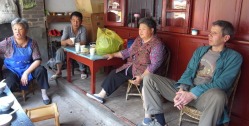









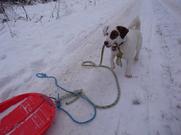
 RSS Feed
RSS Feed